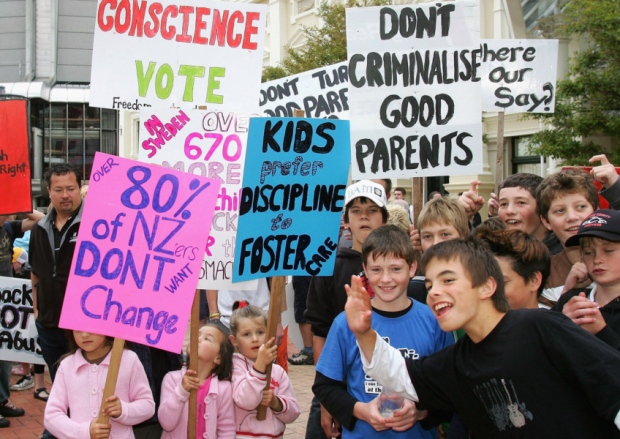Bob McCoskrie: Smacking ban does more harm than good
 The Scotsman 27 February 2016
The Scotsman 27 February 2016
Family First Comment: Family First NZ featured in major daily newspaper in Scotland as they debate smacking bans
NEW Zealand introduced a smacking ban in 2007. Then in a 2009 non-binding referendum, 87 per cent voted against the law – a result which the conservative government chose to ignore.
Based on our experience, I would encourage Scottish parents to ask this question; is the proposed ban on smacking more about political ideology than about any real understanding of how a ban will impact families?
Let’s be clear. In many cases, parental guidance and correction will be non-physical. Time-out, withdrawal of privileges, a telling-off, grounding. However, sometimes a parent may reasonably decide that a smack is the most effective way to correct or prevent unacceptable behaviour.
Anti-smacking policies are problematic because they contradict many adults’ own childhood experiences with discipline and their long-term outcomes. Many of us received a well-warranted smack and didn’t think of it as abuse, just as we didn’t think of a good telling-off as a form of abuse.
Sometimes these parenting techniques do become abusive, but that says more about the type of parent than the technique being used. Any parenting technique can be abused.
So what has happened in New Zealand? Our analysis has concluded that there is not a single social indicator relating to the wellbeing of children that has shown significant or sustained improvement since the passing of the law – in fact, they’ve got worse.
Since the passing of the 2007 law, police statistics show there has been a 136 per cent increase in physical abuse, 43 per cent increase in sexual abuse, and a 45 per cent increase in neglect or ill-treatment of children.
But here is my warning to the people of Scotland. There is also evidence that the law is doing more harm than good.
The anti-smacking law has targeted law-abiding parents. An independent legal analysis at the end of 2014 of court cases involving prosecutions for smacking found that statements made by politicians that the smacking ban would not criminalise “good parents” for lightly smacking their children are inconsistent with the legal effect and application of the law. A survey in 2011 – four years after the law was passed – found that almost a third of parents of younger children say that their children have threatened to report them if they were smacked, and almost one in four parents of younger children say that they have less confidence when dealing with unacceptable behaviour.
Two out of three New Zealanders say they would flout the law, and three out of four New Zealanders want the law amended.
The problem is that politicians and anti-smacking lobby groups linked good parents who smacked their children with child abusers – a notion roundly rejected by families.
Anti-smacking laws assume that previous generations disciplined their children in a manner that was so harmful that they would now be considered criminals. This undermines the confidence of parents in disciplining their children, fails to understand the special relationship and functioning of families, and has communicated to some children that they are now in the “driving seat”.
Some lead researchers suggest that, despite the best of intentions, the prohibition of all forms of physical correction may inadvertently undermine appropriate parental discipline, with the result that a small but increasing percentage of boys may grow up with a dangerous combination of disrespect for their mothers and a lack of self-control.
The researchers note that critics of anti-smacking laws have been unable to identify alternative methods of discipline that are as effective in reducing child behaviour problems when using the same scientific results used to denounce smacking.
Milder disciplinary tactics may be sufficient for easily managed children, but they are inadequate for controlling the behaviour of young oppositional defiant children.
Ultimately, as we have observed, the supporters of smacking bans are influenced by political ideology rather than common sense, good science and sound policy-making. «
Bob McCoskrie is national director of Family First New Zealand.
http://www.scotsman.com/news/bob-mccoskrie-smacking-ban-does-more-harm-than-good-1-4039104
Scots parents urged to resist bid to ban smacking children
The Scotsman 27 February 2016
SCOTTISH parents are being urged to argue against a ban on smacking children by family campaigners in New Zealand where it has been outlawed for the past decade.
The Family First organisation has warned that the 2007 ban has not resulted in any improvement in children’s “wellbeing” – and in many cases it has worsened.
It is now offering to advise Scottish opponents of such a move here after children’s minister Aileen Campbell recently hinted that ministers are considering a ban.
Campbell revealed that New Zealand was among the countries which the Scottish Government is now looking to “learn from” in its approach to tackling physical punishment of children. Ministers in Scotland say they oppose smacking but have no plans to legislate until a full consultation is carried out.
But Family First New Zealand, in an article for Scotland on Sunday today, warns that the move may be more about “political ideology” then the impact on families.
National director Bob McCoskrie said the group has already been in contact with politicians and family organisations in Scotland to discuss New Zealand’s experience.
He warns in today’s article that the New Zealand ban has not been a success.
“The problem is that politicians and anti-smacking lobby groups linked good parents who smacked their children with child abusers – a notion roundly rejected by families,” he states.
“A law change would also communicate the message that politicians don’t trust Scottish parents to raise their own children responsibly.
“Ultimately, as we have observed, the supporters of smacking bans are influenced by political ideology rather than common sense, good science and sound policy-making.
“Criminalising good parents who simply want to raise law-abiding and responsible citizens is bad law-making.”
Parents in New Zealand now report they increasingly face threats from younger children to report them if they are smacked. About a quarter of parents now say they are less confident in tackling unacceptable behaviour of children.
In Scotland, although physical punishment of children is classed as assault, smacking is generally allowed under the defence of “reasonable chastisement”. A growing body of children’s campaign groups and academics want to see this defence removed.
Rev David Robertson, moderator of the Free Church of Scotland, said he was opposed to any form of abusive behaviour towards children, but added that an outright ban on smacking was “over the top”.
He added: “To criminalise parents who may be good and loving people and are only looking out for their children is just daft and is just another example of the moral thought police approach.
“It seems to me that the evidence for a smacking ban is very limited. It’s something you should do rarely, but in some instances you could argue it may be more abusive not to discipline a child.”
A Scottish Government spokeswoman said last night: “We do not support the physical punishment of children. In line with our Parenting Strategy we will be developing comprehensive, practical advice on different approaches to support parents in managing their children’s behaviour.”
http://www.scotsman.com/news/politics/scots-parents-urged-to-resist-bid-to-ban-smacking-children-1-4039173
Family campaign group issue advice to parents in Scotland
Mummy Pages 27 February 2016
Following on from whispered suggestions that ministers in Scotland are currently considering the implementation of a ban on smacking children, a family campaign group from New Zealand, The Family First, have reached out to parents and advised against supporting the potential move.
Drawing on their own experience, the campaign group have insisted that the introduction of the law in their own country in 2007 did not herald a change in childrens’ ‘well-being’, but in many cases negatively affected family life.
Acknowledging Children’s Minister, Aileen Campbell’s recent hints that Scotland may soon join New Zealand on their stance on the matter, Family First New Zealand warns the public that the move may be less to do with family wellbeing and more to do with a political ideology.
Outlining the reasons why parents in Scotland should reject the proposed ban, National director Bob McCoskrie, explained: “A law change would also communicate the message that politicians don’t trust Scottish parents to raise their own children responsibly.”
READ MORE: http://www.mummypages.co.uk/family-campaign-group-issue-advice-to-parents-in-scotland
‘Smacking ban does more harm than good’
The Christian Institute 3 March 2016
A ban on smacking ‘does more harm than good’, and Scottish parents should argue strongly against any attempt to change the law, a pro-family campaign group has said.
Family First New Zealand has highlighted the dangers of such a legislative change, using evidence from the effects seen there.
The group has been contacting politicians and family organisations in Scotland after Children’s Minister Aileen Campbell signalled that ministers are considering a ban.
READ MORE: http://www.christian.org.uk/news/smacking-ban-does-more-harm-than-good/







